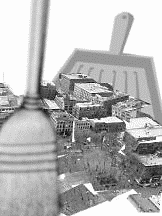SEATTLE IS A CITY that still loves its blue laws. Ask Mayor Sidran . . . excuse me, Schell, who late last week vetoed the repeal of the so-called Teen Dance Ordinance. Despite extensive work to achieve a near political consensus on a piece of legislation passed with strong support by the City Council, the mayor killed it off because it wouldn’t have worked like the old law it was replacing which, of course, was the point. It also wouldn’t have guaranteed loads of work to off-duty cops, which is a provision Schell would like to see in a “revamped” law.
Perhaps the mayor feels he’s lost the youth vote anyway with his WTO shenanigans: He’s now giving full rein to no-protest zone Paul, a mayor whose political future lies not with the city’s more youthful and progressive elements but with the Tipper Gores who live in Magnolia and fear that the downtown hellmouth will swallow their dancing sons and daughters whole. Perhaps the mayor has been junketing in the Nooksack Valley town of Lynden, where the Dutch Reformers banned drinking and dancing altogether.
Of course, politically, Schell also needs to mend fences with the city’s cops. Getting them some paying gigs at youth dances might be just the way to earn back a little capital from the bigger boys and girls in blue while he spreads around some green.
BUT THE MAYOR ISN’T the only one who has a stick up his ass. The City Council is trying to clean up Pioneer Square—making it safer for the dot-comers and gentrifiers—by asking a dozen or so merchants to comply with a ban on the sale of certain kinds of alcoholic beverages during late-night hours. Just as with the Sidran street-sitting laws, this plan, which was passed 8-0 by the council, is ostensibly designed to give law enforcement officials tools to target drunks, winos, and revelers—and the businesses that cater to them—in the one part of town that has long been a haven for such people. A charming-sounding group called the Chronic Public Inebriate Systems Solutions Committee—oh, Carrie Nation would be proud—is going to push local businesses to get in line with the ban.
In a city that denies it has ever engaged in racial profiling, does it strike anyone else as scary that these restrictions are so specific? That they target a list of 68 particular beverages, specific legal brands, sizes, and types of alcohol—malt liquors and screw-top wines, ice beers—that are favored by particular socio-economic, ethnic, and racial groups? As far as I know, however, the ban does not apply to the late-night sales of mouthwash, colognes, or other products that hard-core drunks have been known to imbibe when the going gets rough. But if yours happens to be a brand or type that isn’t considered politically correct, drunk or not, you’re out of luck.
Such rules will do nothing to help alcoholics—they are designed to target the people who have nowhere else to go, no home or social network that will accept them, no Cheers that will tolerate them. They have a disease, but don’t have the means or graces to keep it behind closed doors. The state—and city—are happy to cater to drunks as long as they go home to Laurelhurst or Lake City and keep their problems out of sight. If you drink and beat your kids, no one is holding the store where you bought your booze accountable, least of all the state liquor establishment. But get drunk on a sidewalk? That’s another story.
Sure, public drunks are a pain in the ass—and damn them for hanging out in a part of town where the missions are, the place that once offered them the most support and the most tolerance. This ban won’t help them into treatment, it’s just a nudge to move them somewhere else, where less affluent neighbors won’t complain as loudly.
The folks who move to Pioneer Square and bitch about the drunks are as bad as the yuppies who move to Carnation and complain about the smell of cow shit.
You cannot simply legislate drunks and their enablers out of existence; for better or worse, they’re part of the fabric of the city. Do we want to live in a place that’s been Giulianied to please our fustiest citizens? Do we want to restrict legal products simply because we’re prejudging the adults who buy them? How far will that thinking go?
THE MAYOR AND HIS business buddies are always blabbing about how world-class this city is, but every world-class city has districts where the down-and-out belong and where sinners—rich and poor—find pleasure or kill their pain. Seattle offers few pleasures of the international sort—foreign businessmen frequently complain at how bush-league our nightlife is. We keep Disneyland hours and tout Singapore values.
Our prissy housecleaning, street-sweeping ways signal a city filled with busybodies who think a happy home is a tidy home and who think keeping the shopkeepers happy promotes culture. As the place that popularized the term Skid Road, we were once identified as a town with a high tolerance for lowlifes, tramps, boozers, and bums—hell, they founded the place. Our city used to be just a timber mill and a whorehouse. But for many decades, our energy and identity came from being a safe harbor for difference, where race, class, and morals of all kinds were tolerated and found a place. Not always a happy place, but a place.
In Pioneer Square, our historic district, we’re running away from that very history. At the same time, we’re soaking the suckers with underground tours and tales that tout our naughty past.
We’re dining off the sins of the very kinds of people we’re stepping on today. Why don’t they pass a law against that?







